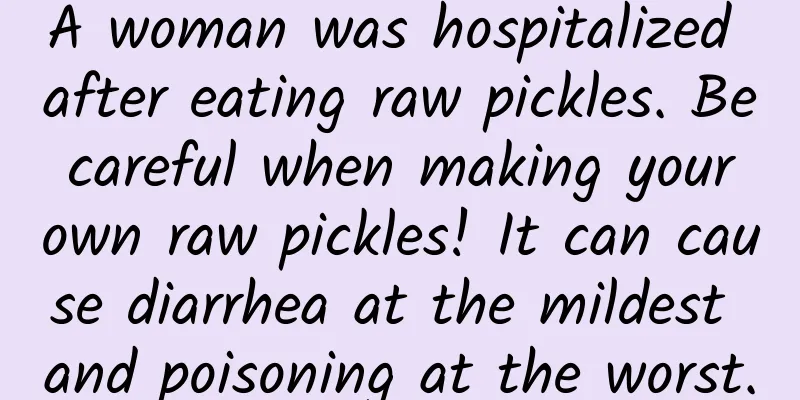If the fruit is moldy and rotten, can I still eat it after cutting off the rotten part?

|
Can we still eat rotten fruit? Some people think that once something is rotten, it should be thrown away and cannot be eaten. Although the problem is small, there is no definitive answer, which makes people feel uneasy about eating fruit. In order to solve this confusion, we specially "raised" some rotten fruits and prepared to do a simulation test. See if these fruits are still edible: Remove any rotten parts of the fruit Fruit next to rotten fruit Dad's real shot 01 Cut out the rotten parts of the fruits. We chose a pear and a peach. Choose a place with suitable temperature and start growing them until they all develop mold and begin to rot. Cut out the rotten part of the fruit and send it together with the non-rotten part (2 cm outside the rotten part) to the laboratory for testing. Also sent for testing were fresh pears and peaches. Sampling 2 cm away from the rotten part The test results are as follows: The results show: There is very little mold and bacteria in fresh peaches and pears; The mold count of moldy and rotten fruits was very high, reaching more than 100,000. Even millions of molds were detected in rotten peaches. Even in the parts that were not rotten or moldy, tens of thousands of molds were still detected. The mold requirement for general food is ≤100 CFU/g, which is obviously exceeded. Let’s take a look at what the non-moldy part looks like under a 1000x microscope. Mold is clearly visible It seems that even if there is no hair, there are still a lot of mold lurking in other places. In addition to excessive mold, rotten fruit presents a bigger risk problem: toxins. Too much mold will produce toxins, which will spread in the flesh. Even places that don't look moldy may already have invisible mycelium and may even contain toxins. If eaten, it is very likely to cause food poisoning. Take the most common green mold on the surface of fruit as an example. It produces patulin, which may cause intestinal dysfunction, renal edema, etc. So if the fruit is rotten or moldy, it is best to throw the whole thing away, even if it is a little rotten. However, if the fruit becomes soft due to impact or falling and appears to be rotten, it is actually just mechanical damage and it is fine to eat it quickly. However, after the fruit has become softened, it must be eaten quickly, otherwise it will easily rot if left for too long. 02 Next to the rotten fruits, we chose a box of cherry tomatoes. Leave it for a while until some small rotten tomatoes appear. The rotten tomatoes and the intact tomatoes next to the rotten samples were sent to the laboratory for testing separately. The results are as follows: The results show: The rotten cherry tomatoes have mold counts reaching millions and are definitely not edible. The non-moldy cherry tomatoes next to the moldy samples looked intact, but the actual number of mold fungi measured was already over ten thousand, which was obviously above the standard. This phenomenon is particularly common in oranges, grapes, and cherry tomatoes. Because these fruits are stored close to each other, if one of them rots, it will easily contaminate the adjacent fruits. Our recommendation: If the fruit is rotten, it is recommended to discard it in time to prevent contamination of other fruits, and try not to eat the fruits next to it. Summary 1. If the fruit is left to rot, don't eat it. Even in areas where mold spots are not visible, there are actually tens of thousands of molds, which can easily cause food poisoning if eaten. 2. If the fruit is next to rotten fruit, the mold content may also exceed the standard, so it is best not to eat it. 3. If the fruit becomes soft due to impact or falling, it may appear to be rotten, but in fact it is only mechanical damage. It is fine to eat it quickly. 4. Some tropical fruits will be frozen if placed in the refrigerator (such as bananas and mangoes). These fruits will turn black and soft, but they are still edible. 5. Similarly, the same goes for tuber vegetables such as red/purple sweet potatoes and taro. As long as they are a little rotten or moldy, it is best not to eat them. Frugality is a virtue, but if you eat moldy fruit and end up in the hospital, both your wallet and your body will suffer. For health reasons, stay away from moldy fruits. |
<<: What ribs to use for stewing rib soup (ribs with thin and lean meat, less oil, and tender taste)
>>: Urinary tract infection, a humble disease, made me go back to hell | Guokr Patient
Recommend
When is the best time for women to lose weight?
According to scientific theory, losing weight at ...
What should I do if my leucorrhea is itchy like tofu dregs?
If you find that your leucorrhea is like tofu dre...
How to treat hemorrhoids during pregnancy
Hemorrhoids during pregnancy is a very common sym...
The house is not ventilated and stuffy. What are the solutions? How to renovate the house better?
We all know that house decoration is quite compli...
Why is my libido low after giving birth?
Only women themselves know the pain their bodies ...
Pregnant woman's mouth is sour, it is a boy or a girl
A sour mouth in a pregnant woman has nothing to d...
How many days are there in seven weeks of pregnancy
Many mothers are troubled by calculating their pr...
The fastest way to turn the breech position
Pregnant women all know that if the fetus's b...
What is the reason for back pain during seven months of pregnancy?
From the moment menstruation stops, women will ha...
Side effects of female injections
Blockade acupuncture is a common method of treati...
How much does it cost to have a blocked fallopian tube angiography?
Contrast examination is required to check the bil...
Minimally invasive abortion surgery precautions
There are many types of abortion surgeries. When ...
How big is the follicle in the test tube?
Nowadays, many young people advocate celibacy and...
The magical effect of PD-1/PD-L1 inhibitors
In the "war" between the human body and...
How to make bangs grow faster
Some people's hair grows very slowly, or they...









